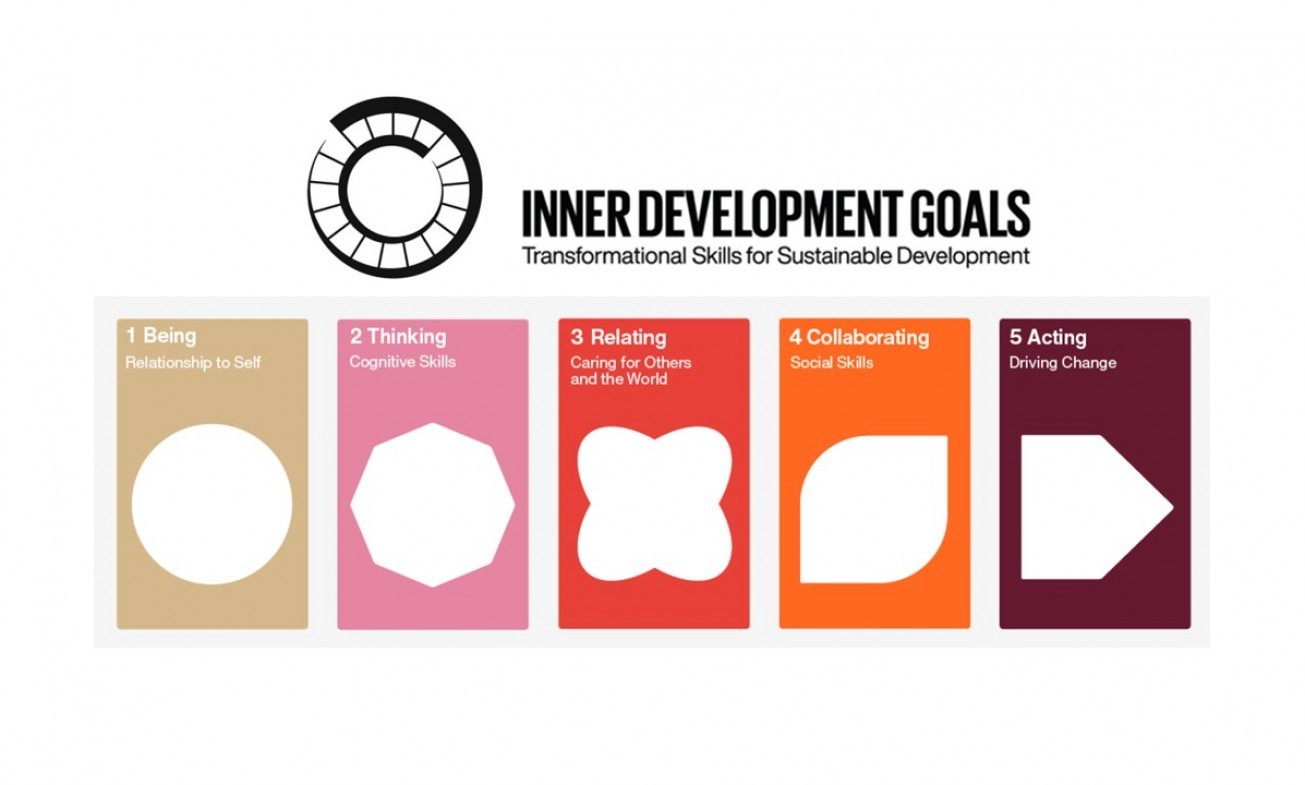Inner Development Goals
More being and less doing.
That’s probably how I’d summarize the overall framework of the Inner Development Goals (IDGs), which are some key transformational skills for sustainable development.
The IDGs are, basically, the missing element to reach the Sustainable Development Goals (SDGs), because, without a radical shift in the structure of our inner world, we cannot bring about that equally radical shift in our exterior world.
The IDGs contribute by identifying the personal and interpersonal skills and capacities that we must develop to make the vision of the SDGs possible.
They focus on improving our relationship with ourselves, our communities, and nature, as well as improving our cognitive capacities and ability to collaborate with others to bring about change and act on our vision.
The IDGs have been organized into 5 dimensions containing 23 skills and qualities of human inner growth and development.
1. Being — Relationship to Self
Cultivating our inner life and developing and deepening our relationship to our thoughts, feelings, and body help us be present, intentional, and non-reactive when we face complexity.
Inner compass
Having a deeply felt sense of responsibility and commitment to values and purposes relating to the good of the whole.
Integrity and Authenticity
A commitment and ability to act with sincerity, honesty, and integrity.
Openness and Learning Mindset
Having a basic mindset of curiosity and a willingness to be vulnerable and embrace change and grow.
Self-awareness
Ability to be in reflective contact with own thoughts, feelings, and desires; having a realistic self-image and ability to regulate oneself.
Presence
Ability to be in the here and now, without judgment and in a state of open-ended presence.
2. Thinking — Cognitive Skills
Developing our cognitive skills by taking different perspectives, evaluating information, and making sense of the world as an interconnected whole is essential for wise decision-making.
Critical thinking
Skills in critically reviewing the validity of views, evidence, and plans.
Complexity awareness
Understanding of and skills in working with complex and systemic conditions and causalities.
Perspective skills
Skills in seeking, understanding and actively making use of insights from contrasting perspectives.
Sense-making
Skills in seeing patterns, structuring the unknown, and being able to consciously create stories.
Long-term orientation and Visioning
Long-term orientation and ability to formulate and sustain a commitment to visions relating to the larger context.
3. Relating — Caring for Others and the World
Appreciating, caring for, and feeling connected to others, such as neighbors, future generations, or the biosphere, helps us create more just and sustainable systems and societies for everyone.
Appreciation
Relating to others and to the world with a basic sense of appreciation, gratitude, and joy.
Connectedness
Having a keen sense of being connected with and/or being a part of a larger whole, such as a community, humanity, or global ecosystem.
Humility
Being able to act in accordance with the needs of the situation without concern for one's own importance.
Empathy and Compassion
Ability to relate to others, oneself, and nature with kindness, empathy, and compassion and address related suffering
4. Collaborating — Social Skills
To progress on shared concerns, we need to develop our abilities to include, hold space and communicate with stakeholders with different values, skills, and competencies.
Communication skills
Ability to really listen to others, to foster genuine dialogue, to advocate own views skillfully, to manage conflicts constructively, and to adapt communication to diverse groups.
Co-creation skills
Skills and motivation to build, develop and facilitate collaborative relationships with diverse stakeholders, characterized by psychological safety and genuine co-creation.
Inclusive mindset and intercultural competence
Willingness and competence to embrace diversity and include people and collectives with different views and backgrounds.
Trust
Ability to show trust and to create and maintain trusting relationships.
Mobilization skills
Skills in inspiring and mobilizing others to engage in shared purposes.
5. Acting — Driving change
Qualities such as courage and optimism help us acquire true agency, break old patterns, generate original ideas, and act with persistence in uncertain times.
Courage
Ability to stand up for values, make decisions, take decisive action and, if need be, challenge and disrupt existing structures and views.
Creativity
Ability to generate and develop original ideas, innovate, and be willing to disrupt conventional patterns.
Optimism
Ability to sustain and communicate a sense of hope, positive attitude, and confidence in the possibility of meaningful change.
Perseverance
Ability to sustain engagement and remain determined and patient even when efforts take a long time to bear fruit.
**************
During 2022 I have been actively participating in the global community of practitioners, scientists, employees, consultants, coaches, and more who are working together to put the open-source IDG framework into action, collectively.
In a few months, this community has grown organically fast and with a strong spirit of mutual learning and co-creation.
There are many facets to explore and put into practice in an organization’s development programs based on the IDGs.
The time is now!
2023, here we go!
without a radical shift in the structure of our inner world, we cannot bring about that equally radical shift in our exterior world
